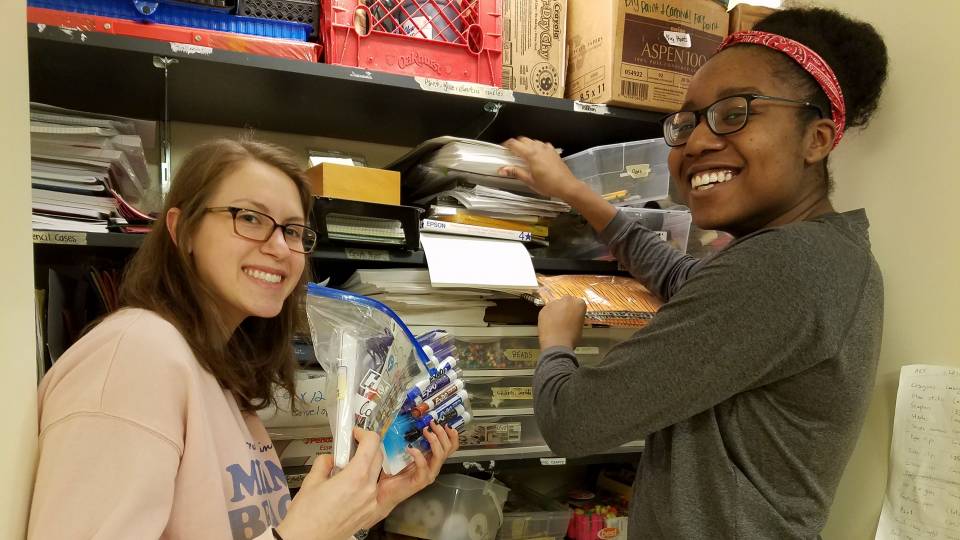Approximately 130 Princeton University students will spend part of their intersession break on Jan. 24-27 volunteering with local community partners and developing skills that will help them become effective leaders for social change through a new program called Inter-Action 2010.
The program, scheduled for the week between Princeton's fall and spring semesters, is organized by the Pace Center, the University's central resource for civic engagement. It is sponsored with funds provided by the University's Undergraduate Student Government (USG) through a student referendum approved last spring to support student-initiated service projects coordinated by the Pace Center.
Students will volunteer at more than 15 community organizations in Princeton and Trenton, attend speaker sessions with national and statewide civic engagement leaders, and participate in workshops examining different approaches to community involvement.
Speakers include Harry Pozycki, chair of the Citizens' Campaign, which recruits, educates and mentors new civic leaders in New Jersey, and Omo Moses, founder of The Young People's Project, which is part of a national mathematics literacy project aimed at helping low-income and students of color acquire math skills.
Pozycki will speak on Monday, Jan. 25, and Moses will speak on Tuesday, Jan. 26. Both sessions are scheduled for 2 p.m. at the Trenton Masonic Temple, 100 Barracks St., Trenton. [NOTE: The speaker sessions are not open to the public, but media interested in covering the talks may contact Pace Center communications director Catherine Kerr at ck2@princeton.edu.]
Inter-Action 2010 activities were developed by several working committees and a central steering committee consisting of University students and Pace staff members.
"Inter-Action 2010 is a great example of Princeton students' imaginative leadership and dedication to public service. It presents a terrific opportunity for students to work with community partners, understand issues in a deeper way, and prepare themselves for public leadership," said Kiki Jamieson, the Class of 1951 Director of the Pace Center. "Through their work, the students are responding to real needs, making tangible differences and creating sustainable ties to local communities. This great initiative is made possible by the extraordinary generosity of the Princeton student body."
The program will open with a kickoff event and orientation for participating students on Sunday, Jan. 24. Students then will spend the next three mornings volunteering at the following community partners in Princeton and Trenton: the Anchorage; Isles Inc.; YWCA of Trenton; Mercer Street Friends Food Bank; Habitat for Humanity-Trenton area; El Centro de Recursos para Familias; GetSET; Crisis Ministry of Princeton and Trenton; Mercer Alliance to End Homelessness; Kidsbridge Tolerance Museum; Mobile Meals of Trenton/Ewing; John Witherspoon Middle School; Trenton Tots; Rescue Mission of Trenton; American Red Cross; and Community House.
In the afternoons, students will attend sessions structured around the topics of: effecting change through the political process (Jan. 25); effecting change through grassroots or community organizing (Jan. 26); and effecting change through social entrepreneurship (Jan. 27). The sessions will begin with a keynote speaker, followed by workshops led by expert practitioners from around the region.
Evening activities will include movie screenings, live performances and discussions around issues of community service and social justice. Students on Jan. 24 will see a performance by the Rebecca Davis Dance Company featuring excerpts from "DARFUR," a multimedia modern dance production designed to raise awareness and funds for victims of genocide, followed by a discussion. Other evening activities will include a performance by step and drum groups and a screenings of "The Agronomist," a 2003 documentary about slain Haitian civil rights leader Jean Dominiqe that also traces the recent history of Haiti, and "Trouble the Water," a 2008 documentary about Hurricane Katrina, followed by a discussion on responding a humanitarian crises.
"What's most exciting to me about Inter-Action is the breadth of civic engagement we are going to be able to capture during these three days," said steering committee member and Princeton senior Reilly Kiernan. "Through the program, we will give students the chance to engage in meaningful direct service as well as to learn about and reflect upon many different avenues for effecting social change. I think this program has the capacity to inspire ongoing commitment to civic engagement by exposing students to new opportunities and increasing their understanding of social change."
Kiernan said the steering committee tried to reach out to groups of students who aren't typically involved in the civic engagement activities on campus during the semester so that the program could include a broad cross-section of the University community.
Inter-Action 2010 was open to all undergraduates who signed up during a registration period in November and December. All food, transportation, training and activities will be provided by the program at no cost to the participants. Most of the activities will take place at sites in the community, although the students will be housed in their campus dormitory rooms.
"We at the Pace Center are proud of the students who worked to organize this, and we were happy to be able to support them," Jamieson said. "Steering committee leaders Kiernan, junior Runqiu Cai and junior Jenny Monson have shown extraordinary leadership. Through their vision and leadership, they have created a program that can serve as a model for students at other universities who want to engage meaningfully with their local communities."
Inter-Action 2010 is one of 10 Pace Center initiatives being supported by an estimated $90,000 in USG funds that were redirected from a fall concert and other USG-sponsored activities through a student referendum passed in April 2009. The funding is intended to offer assistance to local communities hurt by the economic recession and at the same time provide more civic engagement opportunities for Princeton students, especially those whose schedules do not permit them to volunteer on a regular basis during the academic term.
Media interested in more information about the Pace Center or the Inter-Action program should contact Catherine Kerr, communications director for the Pace Center, at ck2@princeton.edu or (609) 258-7443.
